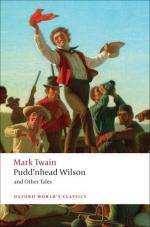I heard the story told by a man who was not telling it to his hearers as a thing new to them, but as a thing which they had witnessed and would remember. He was a dull person, and ignorant; he had no gift as a story-teller, and no invention; in his mouth this episode was merely history—history and statistics; and the gravest sort of history, too; he was entirely serious, for he was dealing with what to him were austere facts, and they interested him solely because they were facts; he was drawing on his memory, not his mind; he saw no humour in his tale, neither did his listeners; neither he nor they ever smiled or laughed; in my time I have not attended a more solemn conference. To him and to his fellow gold-miners there were just two things in the story that were worth considering. One was the smartness of its hero, Jim Smiley, in taking the stranger in with a loaded frog; and the other was Smiley’s deep knowledge of a frog’s nature—for he knew (as the narrator asserted and the listeners conceded) that a frog likes shot and is already ready to eat it. Those men discussed those two points, and those only. They were hearty in their admiration of them, and none of the party was aware that a first-rate story had been told in a first-rate way, and that it brimful of a quality whose presence they never suspected—humour.
Now, then, the interesting question is, did the frog episode happen in Angel’s Camp in the spring of ’49, as told in my hearing that day in the fall of 1865? I am perfectly sure that it did. I am also sure that its duplicate happened in Boeotia a couple of thousand years ago. I think it must be a case of history actually repeating itself, and not a case of a good story floating down the ages and surviving because too good to be allowed to perish.
I would now like to have the reader examine the Greek story and the story told by the dull and solemn Californian, and observe how exactly alike they are in essentials.
[Translation.]
THE ATHENIAN AND THE FROG.[1]
An Athenian once fell in with a Boeotian who was sitting by the road-side looking at a frog. Seeing the other approach, the Boeotian said his was a remarkable frog, and asked if he would agree to start a contest of frogs, on condition that he whose frog jumped farthest should receive a large sum of money. The Athenian replied that he would if the other would fetch him a frog, for the lake was near. To this he agreed, and when he was gone the Athenian took the frog, and, opening its mouth, poured some stones into its stomach, so that it did not indeed seem larger than before, but could not jump. The Boeotian soon returned with the other frog, and the contest began. The second frog first was pinched, and jumped moderately; then they pinched the Boeotian frog. And he gathered himself for a leap, and used the utmost effort, but he could not move his body the least. So the Athenian departed with the money. When he was gone the Boeotian, wondering what was the matter with the frog, lifted him up and examined him. And being turned upside down, he opened his mouth and vomited out the stones.




